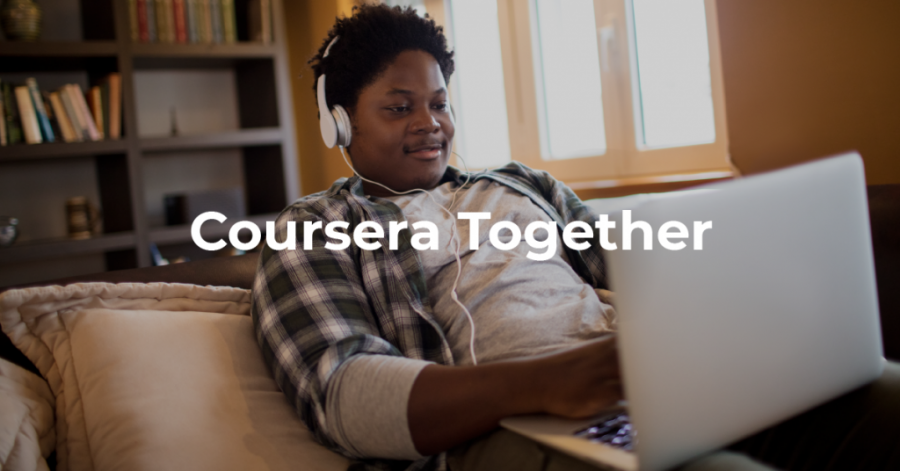Coursera Makes Courses & Certificates Free During Coronavirus Quarantine: Take Courses in Psychology, Music, Wellness, Professional Development & More Online

Over the past decade or two, developments in the technology of the World Wide Web have made learning at home possible in a way it wasn't before. Over the past month or two, learning at home has gone from option to necessity, prevented as many of us are from going out to a classroom by the coronavirus pandemic. If you've taken courses on the internet before — and especially if you've picked them from our selection of 1,500 you can take for free — you've no doubt heard of Coursera, one of the major online learning platforms. Now through May 31st, a period during which the number of potential students will surely remain high, Coursera has made more of its classes free for the taking.
"To help our community during this critical time, we’re launching new, free resources, as well as surfacing interesting course collections, community discussions, and expert interviews," says the official Coursera blog. "While many courses on Coursera are already available for free without a certificate, this promotion enables you to not only access lectures and quizzes, but also to earn a free certificate for courses that offer them." The blog highlights these collections of courses, describing them as follows:
- Free online courses for mental health and well-being: from de-mystifying mindfulness to understanding the science of happiness, we’ve collected top wellness courses to help you prioritize mental health and well-being during these uncertain times.
- Free online courses for high school students: from calculus to guitar for beginners, we’ve rounded up courses to help high school students everywhere keep learning.
- Free online courses for college students: from preparing for an interview to learning data science, we’ve collected courses to make it easier to keep learning.
- Free online courses for career development: from creative problem solving to personal branding, we identified courses to help you build important career skills.
- Free online courses for building your cloud technology career: from machine learning to cloud computing, we’ve curated a set of courses to help you grow your career in an increasingly digital world.
- Free online courses for understanding public health: from the science behind COVID-19 to communicating during global emergencies, we’re making popular public health courses completely free.
- Free online courses in Spanish: from wellness to professional development, we’re making popular Spanish-language courses available for free.
The post also includes the following instructions for how to redeem a free course:
- First, click the link to visit a promotion page.
- From the promotion page, click to visit a specific course and wait for the page to fully load. Once loaded, you will see a promotion banner at the top of the page. If you don’t see the banner, please refresh the page.
- Next, click the "Enroll for free" button.
- Select "Purchase Course." Note that with the promotion applied, there will be a message in parentheses that says "Your promotion will automatically be applied at checkout."
- At checkout, your purchase total will read "$0."
- Complete check out and start learning!
Among Coursera's current free offerings you'll find a host of courses including "Getting Started with Music Theory" from Michigan State University, "Social Psychology" from Wesleyan University, and "Cloud Computing Basics" from LearnQuest. You're as likely to come across subject areas into which you've long been meaning to get deeper as practical education pertinent to the times we now live in. Take "Sit Less, Get Active" from the University of Edinburgh, or "Science Matters: Let's Talk About COVID-19" from Imperial College London, a virus-related course of the kind we've previously featured here on Open Culture. The University of California, San Diego's "Converting Challenges into Opportunities" is also not without its relevance, to the future as well as the present. After all, the coronavirus will hardly be the last challenge in which we'll need to find our own opportunities.
Related Content:
1,500 Free Online Courses from Top Universities
Free Courses on the Coronavirus: What You Need to Know About the Emerging Pandemic
Dyson Creates 44 Free Engineering & Science Challenges for Kids Quarantined During COVID-19
Based in Seoul, Colin Marshall writes and broadcasts on cities, language, and culture. His projects include the book The Stateless City: a Walk through 21st-Century Los Angeles and the video series The City in Cinema. Follow him on Twitter at @colinmarshall, on Facebook, or on Instagram.
Coursera Makes Courses & Certificates Free During Coronavirus Quarantine: Take Courses in Psychology, Music, Wellness, Professional Development & More Online is a post from: Open Culture. Follow us on Facebook, Twitter, and Google Plus, or get our Daily Email. And don't miss our big collections of Free Online Courses, Free Online Movies, Free eBooks, Free Audio Books, Free Foreign Language Lessons, and MOOCs.
from Open Culture https://ift.tt/3eeWttc
via Ilumina
Comments
Post a Comment